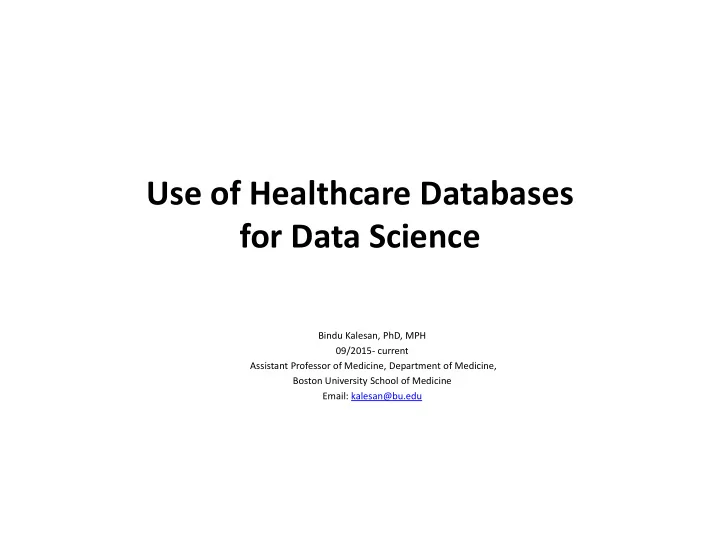

Use of Healthcare Databases for Data Science Bindu Kalesan, PhD, MPH 09/2015- current Assistant Professor of Medicine, Department of Medicine, Boston University School of Medicine Email: kalesan@bu.edu
Health care data • US healthcare industry is currently the hottest job market due to growth in healthcare data. • Healthcare costs - 18% of the GDP. • Data sources for data science: electronic medical records (EMRs), clinical trials, genetic information, billing, wearable data, care management databases, scientific articles, social media, and internet research. – EMR includes lab, imaging, omics etc. – Recently social health determinants at community and individual level • Explosion in digital health – faster and earlier prediction by tracking changes in behavior and vital signs – Wearables (pedometers, Fitbits, Muse headbands) – HealthKits to measure using blood pressure cuffs, glucometers, and scales into EMRs through smartphones - Apple’s HealthKit, Google Fit, and Samsung Health
Paradigm shift Patient care The reactive “sick” care The reactive “sick” care healthcare system [Expensive, ineffective] [Expensive, ineffective] Value-based care Figures used from ECHAlliance
Data science is revolutionizing healthcare With the RIGHT data • Drug discovery : large pharmaceutical companies use pool many clinical trial data and partners with biobanks to expedite the drug discovery process. Use of AI and computer simulation to take drug discovery process to <2 years. E.g., bioscience machine brain. Right medicines, at a lower cost, in less time. • Disease prevention : To transform healthcare is to recognize risks and recommend prevention plans before health risks become a major issue. Digital therapeutics use smart devices to create personalized behavior plans and online coaching to help prevent chronic health conditions.Tracks data of children suffering from autism through wearables, alerting parents before a meltdown occurs. • Diagnosis : ~ 12 million Americans receive misdiagnoses, diagnostic errors cause an estimated 40,000 to 80,000 deaths/ yr. Medical imaging to interpret MRIs, X-rays, mammographies, and other types of images, identify patterns in the data, and detect tumors, artery stenosis, organ anomalies etc.
Data science is revolutionizing healthcare With the RIGHT data • Treatment : individual patient data, omics, genetic and epigenetic data from multiple studies harmonized and pooled will provide a large multidimensional data to allow prediction models. Customize treatment for each patient. Missing key racial groups or age groups will result in biased data. • Post-care monitoring : After surgery or treatment, risk of complications and recurring pain is difficult to manage once the patient leaves the hospital. Remote in-home monitoring. Hospitals predict readmission risk in the next 30 days, based on EMR data and socioeconomic data. • Hospital operations : Hospitals are cost-sensitive and face complex operational problems. Predictive analytics can optimize. Predict the demand for different types of lab tests, cutting wait time by 75%, streamline billing, identify patients who are at risk of late payments or financial difficulties. The Center for Medicare and Medicaid Services saved $210.7 million using big data analytics in fraud prevention.
igital transformation with • Value of AI in healthcare is being cautiously understood. – The hype is strong and persistent to push adoption of game-changing technologies as quickly as possible. – Troublesome data siloes and competing priorities stymied technological progress, – Lack capacity to plan for a seemingly distant future. • Time is now for digital transformation! • Artificial intelligence is maturing. • Data interoperability is improving. • The drivers of consumer-focused healthcare are getting stronger .
Thank you Questions 7
Recommend
More recommend